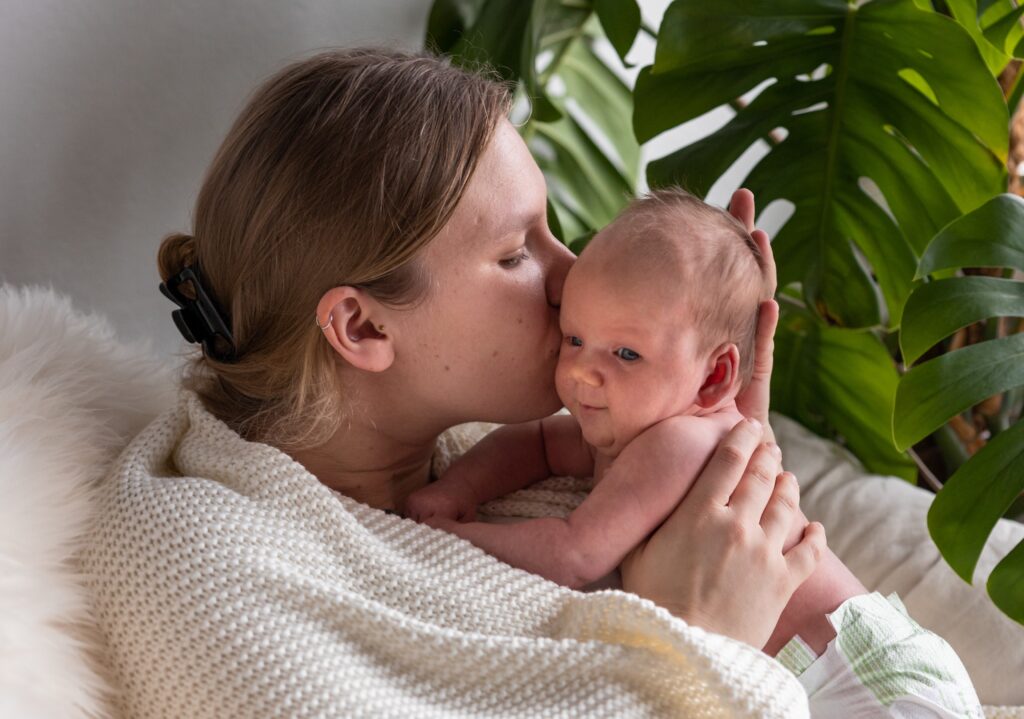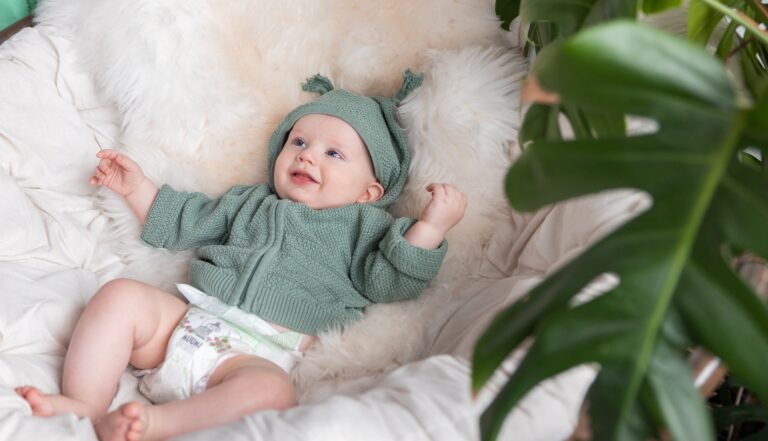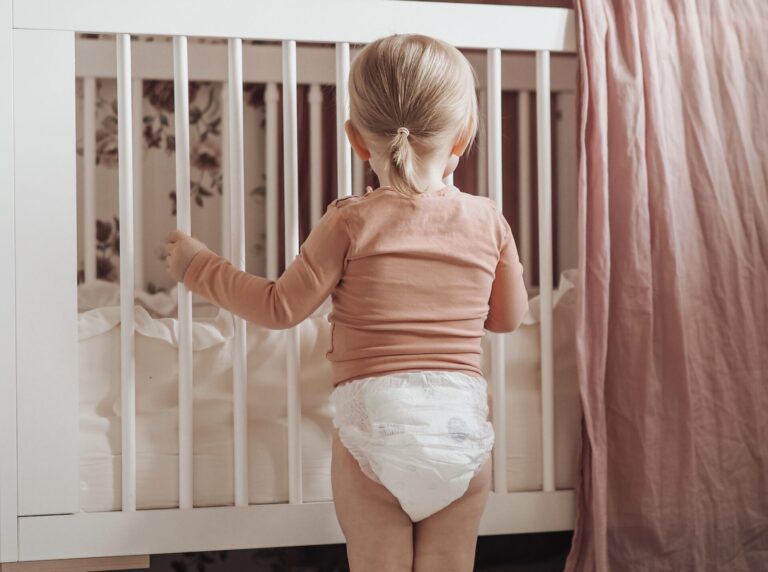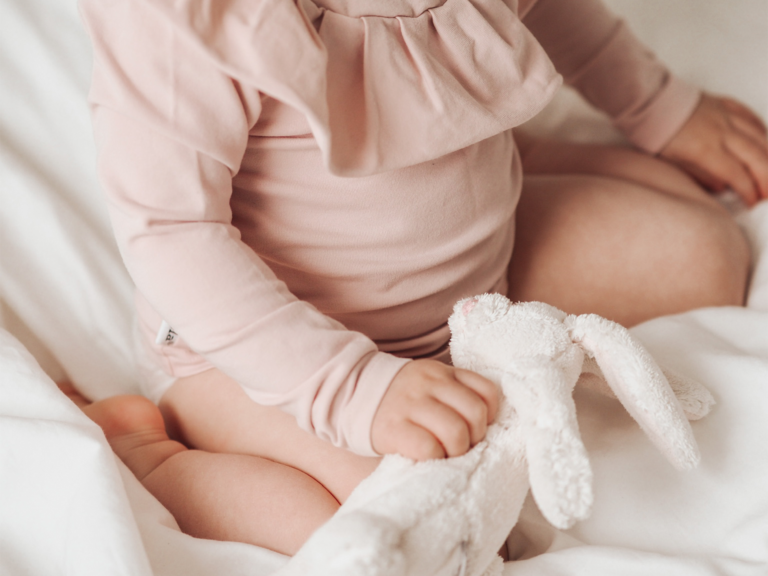A two-month-old baby can sleep up to 14-17 hours a day. In this article, we look at what kind of sleep cycles they usually have and how you can improve their quality of sleep.
What is the normal sleep pattern for a 2-month-old baby?
Often, parents may feel worried if their 2-month-old baby’s sleep rhythm does not match their expectations or differs from that of other babies of the same age. It is important to understand that each baby’s sleep pattern is individual and can vary greatly. In general, a two-month-old baby’s nap length can vary from 30 minutes to 3-4 hours, and there may be several naps during the day. The night sleep starts to settle down and you can expect your baby to sleep longer stretches at night, up to 4-6 hours at a time.
However, this is not the case with all babies, and it is perfectly normal. Sleep is important for a baby’s development and its rhythm develops gradually as the baby grows. The most important thing to monitor is that your baby is alert and in a good mood when awake and gets enough sleep. If your baby has persistent difficulties with sleep, it is a good idea to consult a health professional.
How much sleep should a 2-month-old baby get?
A baby’s need for sleep is high and a two-month-old baby can sleep up to 14-17 hours a day. This includes both daytime and nighttime sleep. The length of sleep cycles can vary: a baby may sleep from just half an hour to as much as five hours at a time. Night sleep is usually the longest, but your baby may still wake up to eat several times a night. It is also normal for some babies to spend more time awake than others of the same age.
It is important to monitor and try to support your baby’s sleep needs, as sleep contributes to your baby’s growth and development. If your baby’s sleep pattern changes or if they seem to sleep poorly or little on a regular basis, it is a good idea to discuss this with your child health clinic or doctor. Usually, a baby’s sleep pattern starts to stabilise and night-time sleep lengthens between 2 and 4 months of age.
Here you can read more about newborn sleep and sleep rhythms!
How to support your 2 month old baby’s sleep: Best tips
Your baby’s sleep pattern may start to stabilise around two months of age, but parental support is important in this development. Regular daily rhythms and routines can help your baby understand the difference between day and night. Feed your baby regularly during the day and reduce the number of feedings at night if possible. You can also gently wake your baby up during the day to eat, which can help them eat more during the day and wake up less at night.
Make sure your baby’s environment is calming and suitable for sleeping. A dark, quiet and cool room promotes good sleep. Also make sure your baby’s sleeping position is safe – lying on their back is the best position. Calming routines such as bedtime baths and bedtime stories can help your baby prepare for sleep. Finally, remember that each baby is unique and needs their own sleep rhythm – the key is to be flexible and adapt to your baby’s needs.
More tips for better sleep can be found here!
Babies can suffer from sleep disorders such as hyperactivity, night wakings or sleep apnea, all of which have their own solutions.
Common sleep disorders and how to treat them
Many babies suffer from sleep disorders such as hyperactivity, night wakings or sleep apnea. A hyperactive baby is endlessly alert and wants to stay awake for long periods of time, which can be challenging for parents. This problem often resolves itself over time as the baby’s circadian rhythm begins to form. Night wakings are normal in babies, but if they persist for a long time, it is worth considering possible causes. For example, your baby may be suffering from hunger, a wet diaper, teething or symptoms of sickness.
Sleep apnea is less common, but its symptoms include interruptions in breathing during sleep. If you suspect your baby has sleep apnea, contact a health professional. Remember that every baby is individual and that sleep disorders can be treated in many different ways. It is important to monitor your baby’s sleep patterns and contact your healthcare professional if you have any concerns or questions.
Link between sleep and feeding for a 2-month-old baby
Feeding and baby’s sleep are closely linked, especially at this age. Your baby eats frequently, even every 2-4 hours, and this directly affects sleep patterns. Often the baby falls asleep after eating and this largely determines the baby’s sleep pattern. In addition, hunger can wake the baby up in the night, so it is important to ensure that the baby eats enough before bedtime.
Generally speaking, the better your baby eats during the day, the better they are likely to sleep at night. It is important to remember that each baby is an individual and needs their own rhythm. As your baby starts to develop a day-night rhythm, their eating pattern will become more regular. If you are worried about your baby’s sleep or eating patterns, talk to your baby’s doctor or a child health clinic.

Managing night waking: A guide for parents
Night wakings in a 2-month-old baby can be challenging for parents, but it’s important to remember that they are a normal part of baby’s development. If your baby wakes up in the night, they may be hungry, their diaper may be wet, or they may just need a little comforting. At this age, babies usually wake every 2-4 hours to eat, but some wake more often.
However, there are often different ways to try to control night waking. Routines before bedtime, such as bathing, can help calm your baby. Your baby’s well-being during the day also affects their sleep at night. Make sure your baby is full and dry before bedtime, and keep an eye out for activity and play during the day to help your baby sleep.
However, remember that for some babies, night feeds are normal for a long time and it is important to listen to your baby’s needs. If the night feedings continue to be intense or if there are sudden changes, it is a good idea to discuss this with a nurse or a doctor.
Sleep school for a 2-month-old baby: Is it reasonable?
Sleep school is a topic that often divides parents. Some prefer it at an early age, while others see it as more suitable for slightly older children. It’s worth remembering that a two-month-old baby is still very young, and night wakings are often perfectly normal and expected at this age.
Many experts recommend that you do not start sleep school properly until your baby is 4-6 months old. By this age, your baby’s sleep and feeding rhythms will have started to settle down and they will be better prepared for longer periods of sleep.
At two months, however, you can already start to establish a good sleep routine for your baby. This could mean, for example, establishing a calming or bedtime routine, or gradually teaching your baby to recognise the difference between daytime and nighttime. Every baby is an individual, and the solutions that work best depend a lot on the baby’s temperament and the parents’ own preferences.
Read more about sleep school here!
Naps vs. night sleep: Is there a difference?
There are several differences in your baby’s day and night sleep that can affect the quality of sleep and your baby’s circadian rhythm. Night sleep is generally longer and deeper than day sleep, partly due to factors related to the body’s natural circadian rhythm and melatonin production.
Secondly, naps are often lighter periods of sleep with waking and falling asleep. However, they are an essential part of a baby’s day because they allow the baby to rest and recover during the day.
Thirdly, night sleep starts to gradually lengthen at two months of age, as your baby begins to understand the difference between day and night. It is important to support this development by calming down at night and keeping the day active.
Fourthly, some studies suggest that the quality and length of daytime sleep may affect sleep at night. Babies who sleep well during the day may also sleep better at night. It is therefore important to ensure that your baby’s naps are long enough and soothing.
The most common sleep problems are night wakings, confusion between day and night sleep rhythms and difficulty falling asleep.
How to deal with sleep problems in a 2 month old baby?
Sleep problems in a 2-month-old baby can cause worry and uncertainty, but the important thing to remember is that sleep problems are perfectly normal at this age. The most common sleep problems are night wakings, confusion between day and night sleep patterns and difficulty falling asleep.
The solution to sleep problems depends very much on your baby’s individual needs and situation. For some babies, calming routines such as evening baths or gentle cuddles on the lap may help. Sometimes sleep problems are caused by physical factors such as hunger, a wet diaper or painful flatulence. In these cases, satisfying needs such as feeding, changing diapers or burping can help.
If sleep problems persist for a long time or affect the well-being of the baby or parents, it is a good idea to contact a nurse or a doctor. They can offer individual guidance and advice on the situation. Remember that every baby and family is different, and what works for one may not work for another.
How do Moomin Baby diapers support the sleep of a 2-month-old baby?
Moomin Baby diapers are designed to support babies’ sleep and increase their comfort. They are particularly good options for babies aged 2 months who are not yet in control of their night-time needs and may wake up with a wet diaper. Moomin Baby diapers make nighttime sleep more comfortable for both babies and their parents.
The diapers are made of soft and breathable materials that keep baby’s skin dry and prevent rashes and other skin problems. They also offer excellent absorbency, which prevents leakage and allows parents to sleep longer and more uninterrupted nights.
Moomin Baby diapers are dermatologically tested and manufactured from only safe and environmentally friendly materials. This is particularly important for babies aged 2 months who are sensitive to allergens and chemicals. In this way, Moomin Baby diapers offer an excellent alternative to ensure your baby has a comfortable and peaceful night’s sleep.











